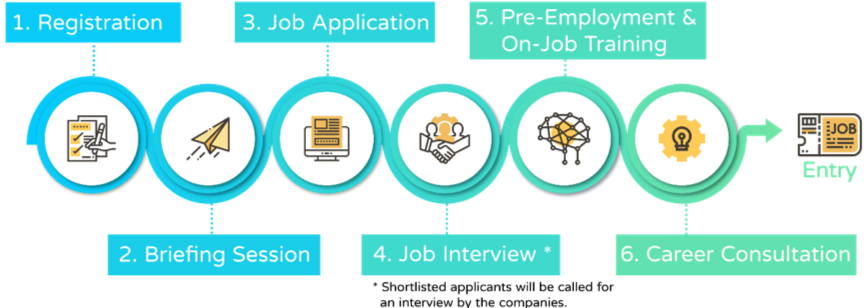//vol.13-1 Interview
- Government job training schemes aim to boost young people’s employment opportunities.
- TOP, administered by HKFYG, is for youth wanting careers in telecoms.
- Some of the other government job skills programmes are designed for GBA placements.
- 香港特區政府的實習計劃旨在提升青年的就業機會。
- 香港青年協會推出的「資訊及通訊科技人才培訓計劃」(Telecommunications Opportunities Programme,英文簡稱TOP)專為有志投身電訊業的青年提供寶貴的機會。
- 同時,政府亦提供一連串專為大灣區實習而設的就業技能培訓計劃。
Young people’s career prospects have been badly affected by the pandemic and they need as much support as they can get. Mr Edward Yau, Secretary for Commerce and Economic Development of Hong Kong, explains why he hopes youth will draw encouragement from a new initiative launched under the Job Creation Scheme of the Anti-epidemic Fund. The Commerce and Economic Development Bureau (CEDB) scheme embraces two programmes. First, the Telecommunications Opportunities Programme (TOP), which is creating 100 full-time job opportunities with HKFYG. Read about examples in the preceding interview.
When asked why the creative industries had come into the limelight in the Future International Talent (FIT) programme, Mr Yau refers to the involvement of 11 Hong Kong chambers of commerce. They are working with locally-based companies to offer over 100 full-time internship positions with priority given to the creative industries.
“While the programme is not sector-specific, we accord priority to our creative industries, namely, advertising, architecture, design, digital entertainment, film, music, printing and publishing, and television.” These are one of the Hong Kong government’s key economic pillars. “They are important for enriching the diversity of Hong Kong’s economy and many recent graduates aspire to careers in this sector.”
Applications for the internships have already begun and the CEDB’s website is listing job ads. As Mr Yau adds, “The employers will also conduct their own recruitment exercises. They are required to make an employment offer within three months of approval of applications.”
Asked about the format and content of the attachments, Mr Yau goes on to say, “For FIT, we anticipate there will be a variety of vacancies for young people.” Employers will provide on-the-job training that contributes to long-term career development. For TOP, employers are also providing a wide range of vacancies including software programmers, assistant engineers, and sales and marketing trainees.”
Beneficial outcomes are expected to continue even though the programme’s subsidies will cease after a maximum of 12 months for each job position. Nevertheless, Mr Yau assures, employers joining the programmes are encouraged to continue employment of the young participants, thereby “providing much-needed job opportunities for our young people at this difficult time.”
“FIT offers global perspectives and wider exposure to young people through work, in particular those who aspire to pursue careers in the creative industries,” he concludes. “For TOP, working and training opportunities in the promising era of 5G telecommunications will help to equip employees with lifelong skill sets for career development.”

Mr Edward Yau has more than 30 years of public administrationexperience and was Secretary forthe Environment from 2007 to 2012then Director of the Chief Executive’sOffice of Hong Kong beforebecoming Secretary for Commerceand Economic Development.
Telecommunications Opportunities Programme (TOP)
This job-creation scheme dedicated to the telecommunications industry was commissioned by the CEDB and is being administered by HKFYG.
Aim Under the umbrella of the HKSAR Government’s Anti-epidemic Fund, its aim is to create 12-month full-time jobs for young people in the telecommunications sector. TOP will make young people more competitive as well as enhancing their employability and nurturing talented youth for the industry.
Eligibility
Applicants joining TOP should be:
- HKSAR residents aged 18 or above holding valid Hong Kong Identity Cards
- Holders of accredited certificates, diplomas, degrees obtained in programmes of post-secondary and tertiary institutes, or have relevant work experience in the telecommunications industry
- Fresh graduates in 2020 or 2021 with no work experience, or young people with amaximum of five years’ work experience
TOP participant employers currently include:
- China Mobile Hong Kong Company Limited
- CITIC Telecom International Holdings Limited
- GOIP Aula Limited
- HGC Global Communications Limited
- Hong Kong Broadband Network Limited
- Hong edKong Communications Company Limited
- HKT Services Limited
- Huawei (Manpower)
- Hutchison Telecommunications (Hong Kong) Limited
- Multibyte Info Technology Limited
- SmarTone Telecommunications Limited
- WiseSpot Company Limit
Over 120 job opportunities for young people, including:
- Systems Analyst
- Digital Commerce Executive
- Junior Software Developer
- … check them all out here: yen.hkfyg.org.hk/top

Greater Bay Area Youth Employment Scheme
January this year saw the launch of the Greater Bay Area Youth Employment Scheme announced by the ChiefExecutive in the 2020 Policy Address. Supported by the governments of Guangdong Province and the ShenzhenMunicipality, it aims to encourage young people to work and pursue careers in the cities of the Guangdong-Hong Kong-Macao Greater Bay Area (GBA), understand more about the latest developments in Hong Kong and the GBA cities andleverage opportunities for career advancement in the GBA. Graduates employed for up to 18 months under the schemewill receive a monthly salary of no less than HK$18,000 including a government monthly allowance of HK$10,000.
The scheme provides 2,000 places, around 700 of which are designated for innovation and technology posts.Eligible graduates for IT posts should have degrees related to science, technology, engineering or mathematics andthey should work in both Hong Kong and GBA Mainland cities, with each location taking up six to 12 months.
The scheme takes into account Hong Kong’s economy and market scale and the fact that the youth unemploymentrate in Hong Kong may remain in double digits for some time. The GBA, on the other hand, offers many careerdevelopment opportunities for the young people of Hong Kong. Under the scheme, enterprises with operationsin Hong Kong and GBA Mainland cities are welcome to join the scheme and offer job vacancies to eligiblegraduates under Hong Kong laws. They will work in mainland GBA cities and receive on-the-job training.
More details https://www.info.gov.hk/gia/general/202101/08/P2021010700723.htm
Read more Youth Hong Kong, June 2019 issue: GBA Living, Working, Commuting
Funding Scheme for Youth Internship in mainland China
The HKSAR Government launched the FundingScheme for Youth Internship in the Mainlandin 2014-15 to provide sponsorship to non-governmental organisations (NGOs) to organizeinternship programmes in mainland China. The scheme aims to enable Hong Kong youngpeople to a gain deeper understanding of thelabour market, work culture and career prospectsthere. It also aims to help them formulate careergoals, gain more work experience and establishinterpersonal networks, thereby enhancing theircompetitiveness in employment in the future.
More details bayarea.gov.hk/en/opportunities/youth.html
Post-Secondary Student Summer Internship Programme in Hong Kong
The 2021 programme, already launched, provides internship placement opportunities for students who are permanent residents of the HKSAR or the People’s Republic of China and enrolled in full-timeaccredited post-secondary programmes offered bypost-secondary institutions in or outside Hong Kong.Internship placement opportunities are advertised by bureau and departments ontheir respective departmental websites andthe Civil Service Bureau’s website.
More details csb.gov.hk/english/admin/appoint/782.html


